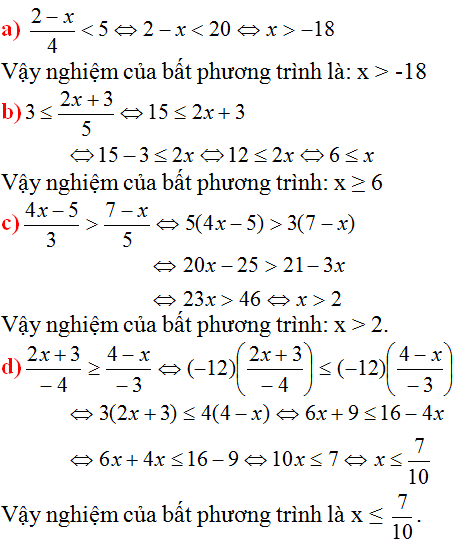Hãy nhập câu hỏi của bạn vào đây, nếu là tài khoản VIP, bạn sẽ được ưu tiên trả lời.

a: \(\Leftrightarrow-12x-4=8x-2-8-6x\)
=>-12x-4=2x-10
=>-14x=-6
hay x=3/7
b: \(\Leftrightarrow3\left(5x-3\right)-2\left(5x-1\right)=-4\)
=>15x-9-10x+2=-4
=>5x-7=-4
=>5x=3
hay x=3/5(loại)
c: \(\Leftrightarrow x^2-4+3x+3=3+x^2-x-2\)
\(\Leftrightarrow x^2+3x-1=x^2-x+1\)
=>4x=2
hay x=1/2(nhận)

a) 1x−3+3=x−32−x1x−3+3=x−32−x ĐKXĐ: x≠2x≠2
Khử mẫu ta được: 1+3(x−2)=−(x−3)⇔1+3x−6=−x+31+3(x−2)=−(x−3)⇔1+3x−6=−x+3
⇔3x+x=3+6−13x+x=3+6−1
⇔4x = 8
⇔x = 2.
x = 2 không thỏa ĐKXĐ.
Vậy phương trình vô nghiệm.
b) 2x−2x2x+3=4xx+3+272x−2x2x+3=4xx+3+27 ĐKXĐ:x≠−3x≠−3
Khử mẫu ta được:
14(x+3)−14x214(x+3)−14x2= 28x+2(x+3)28x+2(x+3)
⇔14x2+42x−14x2=28x+2x+6⇔14x2+42x−14x2=28x+2x+6
⇔

1) điều kiện xác định : \(x\notin\left\{-1;-2;-3;-4\right\}\)
ta có : \(\dfrac{1}{x^2+3x+2}+\dfrac{1}{x^2+5x+6}+\dfrac{1}{x^2+7x+12}=\dfrac{1}{6}\)
\(\Leftrightarrow\dfrac{1}{\left(x+1\right)\left(x+2\right)}+\dfrac{1}{\left(x+2\right)\left(x+3\right)}+\dfrac{1}{\left(x+3\right)\left(x+4\right)}=\dfrac{1}{6}\) \(\Leftrightarrow\dfrac{\left(x+3\right)\left(x+4\right)+\left(x+1\right)\left(x+4\right)+\left(x+1\right)\left(x+2\right)}{\left(x+1\right)\left(x+2\right)\left(x+3\right)\left(x+4\right)}=\dfrac{1}{6}\)\(\Leftrightarrow\dfrac{x^2+7x+12+x^2+5x+4+x^2+3x+2}{\left(x+1\right)\left(x+2\right)\left(x+3\right)\left(x+4\right)}=\dfrac{1}{6}\)
\(\Leftrightarrow\dfrac{3x^2+15x+18}{\left(x+1\right)\left(x+2\right)\left(x+3\right)\left(x+4\right)}=\dfrac{1}{6}\)
\(\Leftrightarrow6\left(3x^2+15x+18\right)=\left(x+1\right)\left(x+2\right)\left(x+3\right)\left(x+4\right)\)
\(\Leftrightarrow18\left(x^2+5x+6\right)=\left(x+1\right)\left(x+2\right)\left(x+3\right)\left(x+4\right)\)
\(\Leftrightarrow18\left(x+2\right)\left(x+3\right)=\left(x+1\right)\left(x+2\right)\left(x+3\right)\left(x+4\right)\)
\(\Leftrightarrow18=\left(x+1\right)\left(x+4\right)\) ( vì điều kiện xác định )
\(\Leftrightarrow18=x^2+5x+4\Leftrightarrow x^2+5x-14=0\)
\(\Leftrightarrow\left(x-2\right)\left(x+7\right)=0\Leftrightarrow\left[{}\begin{matrix}x-2=0\\x+7=0\end{matrix}\right.\) \(\Leftrightarrow\left[{}\begin{matrix}x=2\\x=-7\end{matrix}\right.\left(tmđk\right)\)
vậy \(x=2\) hoặc \(x=-7\) mấy câu kia lm tương tự nha bn

d. ĐKXĐ: x khác 1, x khác 3
\(\dfrac{x+5}{x-1}=\dfrac{x+1}{\left(x-3\right)}-\dfrac{8}{x^2-4x+3}\)
\(\Leftrightarrow\dfrac{\left(x-3\right)\left(x+5\right)}{\left(x-1\right)\left(x-3\right)}=\dfrac{\left(x+1\right)\left(x-1\right)}{\left(x-1\right)\left(x-3\right)}-\dfrac{8}{\left(x-1\right)\left(x-3\right)}\) \(\Leftrightarrow x^2+2x-15=x^2-1-8\)
\(\Leftrightarrow2x-15+1+8=0\)
\(\Leftrightarrow2x-6=0\)
\(\Leftrightarrow x=3\) (loại)
Vậy pt vô nghiệm

Mấy này bạn quy đồng lên cùng mẫu xong khử mẫu rồi giải. Dễ mà.

1)\(-\dfrac{4x-3}{x-5}=\dfrac{29}{3}\Leftrightarrow\dfrac{3-4x}{x-5}=\dfrac{29}{3}\)
\(\Leftrightarrow3\left(3-4x\right)=29\left(x-5\right)\Leftrightarrow9-12x=29x-145\)
\(\Leftrightarrow29x+12x=9+145\Leftrightarrow41x=154\Leftrightarrow x=\dfrac{154}{41}\)
2)\(\dfrac{2x-1}{5-3x}=2\Leftrightarrow2\left(2x-1\right)=5-3x\)
\(\Leftrightarrow4x-2=5-3x\)
\(\Leftrightarrow4x+3x=5+2\Leftrightarrow7x=7\Leftrightarrow x=1\)
3)\(\dfrac{4x-5}{x-1}=2+\dfrac{x}{x-1}\)
\(\Leftrightarrow\dfrac{4x-5}{x-1}=\dfrac{2\left(x-1\right)}{x-1}+\dfrac{x}{x-1}\)
\(\Rightarrow4x-5=2x-2+x\)
\(\Leftrightarrow4x-2x-x=-2+5\)
\(\Leftrightarrow x=3\)
\(1)-\dfrac{4x-3}{x-5}=\dfrac{29}{3} (x \neq 5) \\\Leftrightarrow\dfrac{3-4x}{x-5}=\dfrac{29}{3}\) \(\Leftrightarrow3\left(3-4x\right)=29\left(x-5\right)\\\Leftrightarrow9-12x=29x-145\) \(\Leftrightarrow29x+12x=9+145\\\Leftrightarrow41x=154\\\Leftrightarrow x=\dfrac{154}{41}(TM)\)
Vậy \(S=\left\{\dfrac{154}{41}\right\}\)
\(2)\dfrac{2x-1}{5-3x}=2 (x \neq \dfrac{5}{3}) \)
\(\Leftrightarrow2x-1=2\left(5-3x\right)\\ \Leftrightarrow2x-1=10-6x\\ \Leftrightarrow2x+6x=10+1\\ \Leftrightarrow8x=11\\ \Leftrightarrow x=\dfrac{11}{8}\left(TM\right)\)
Vậy \(S=\left\{\dfrac{11}{8}\right\}\)
\(3)\dfrac{4x-5}{x-1}=2+\dfrac{x}{x-1} (x \neq 1) \\\Leftrightarrow\dfrac{4x-5}{x-1}=\dfrac{2\left(x-1\right)}{x-1}+\dfrac{x}{x-1}\) \(\Leftrightarrow4x-5=2x-2+x\) \(\Leftrightarrow4x-2x-x=-2+5\) \(\Leftrightarrow x=3(TM)\)
Vậy \(S=\left\{3\right\}\)



c) \(\dfrac{x-1}{5}+x=\dfrac{x+1}{7}\)
\(\Leftrightarrow\dfrac{7x-7}{35}+\dfrac{35x}{35}=\dfrac{5x+5}{35}\)
\(\Rightarrow7x-7+35x=5x+5\)
\(\Leftrightarrow7x+35x-5x=5+7\)
\(\Leftrightarrow37x=12\)
\(\Leftrightarrow x=\dfrac{12}{37}\)
Vậy pt có nghiệm duy nhất \(x=\dfrac{12}{37}\)
d) \(2\left(x-2,5\right)=0,25+\dfrac{4x-3}{8}\)
\(\Leftrightarrow\dfrac{16\left(x-2,5\right)}{8}=\dfrac{2}{8}+\dfrac{4x-3}{8}\)
\(\Rightarrow16x-40=2+4x-3\)
\(\Leftrightarrow16x-4x=2-3+40\)
\(\Leftrightarrow12x=39\)
\(\Leftrightarrow x=3,25\)
Vậy pt có nghiệm duy nhất \(x=3,25\)